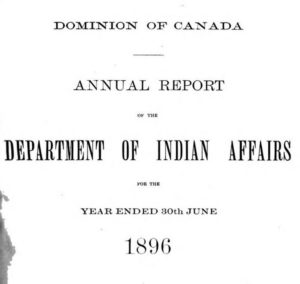
The Crowes’ “Well Built” House
Du Vernet visited the house of Eliza and John Crowe on July 17th. He commented on it being “well built” with “2 double beds a bureau a very fine table and 4 chair trunks.” The ways that ‘Indians’ kept their houses was always written up in the Coutcheeching Indian Agent Report, under a section on “character development.” An Indian Agent on the Rainy River in 1891 reported: “I find these Indians backward in regard to their houses and have taken every opportunity of telling them so. They are too fond of building close together small houses and not enough of them. I want each head of a family to remove on to his own plot of land, and in fact live like white people.”
Housing was a way of assimilating indigenous people into white Canadian society, with very certain ideas about property ownership and the family. Living “like white people” meant living in a house as a separate nuclear family based around European gender roles. For Indian agents and missionaries, a house that enforced the norms of white society was a sign of moral progress.
By 1899, the same Coutcheeching Indian agent reported: “The Indians in this agency have a good reputation for honesty, and will compare favourably with their white neighbours. I am glad to say that their progress in their way of living and in the improvements they have made in the dwellings, such as shingle roofs, flooring and partitions, also a good class of furniture, is very marked on some of the reserves.”
Sources
Dominion of Canada, F. C. Cornish, Indian Agent, Coutcheching Agency, Annual Report of the Department of Indian Affairs for the Year Ended June 30, 1891. Ottawa: Department of Indian Affairs, 1891.
Dominion of Canada, M. Begg, Indian Agent, Coutcheeching Agency, Annual Report of the Department of Indian Affairs for the Year Ended June 30, 1899. Ottawa: Department of Indian Affairs, 1899.
Purdy, Sean. “Scaffolding Citizenship: Housing Reform and Nation Formation in Canada, 1900– 1950.” In Contesting Canadian Citizenship, edited by Robert Adamoski, Dorothy Chunn, and Robert Menzies, 129-154. Peterborough, ON: Broadview Press, 2002.